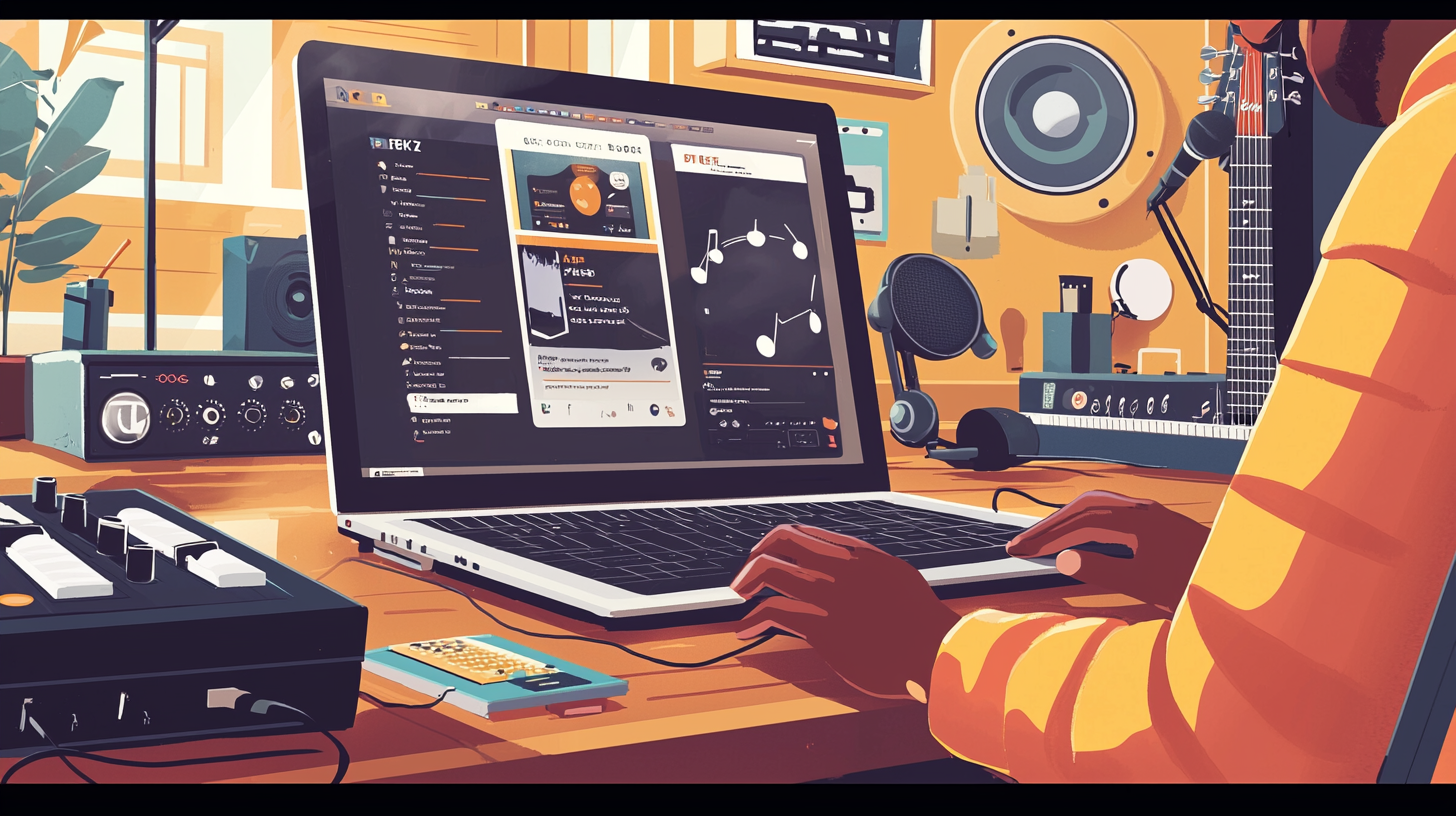Building an EPK (Electronic Press Kit): A Complete Guide for Musicians
An Electronic Press Kit (EPK) is an essential tool for musicians looking to promote their music, book gigs, or attract media attention. Think of an EPK as a musician’s resume—it’s a professional digital document that provides promoters, venues, labels, and media with everything they need to know about you and your music.
In this guide, we’ll explore how to build an effective EPK, including the key components and how Muibas can support your music career by providing collaborative opportunities that can enhance the content of your EPK.
What Is an EPK and Why Do You Need One?
An EPK is a digital portfolio that gives a comprehensive overview of your music career. It’s used to promote your brand, attract attention from industry professionals, and serve as a one-stop resource for anyone interested in your music.
An EPK is essential for:
- Booking Gigs: Promoters and venues need all your info in one place.
- Attracting Media Coverage: Journalists, bloggers, and radio hosts use your EPK to write about you.
- Connecting with Labels or Managers: Music industry professionals use it to evaluate your work and career progress.
Key Components of an EPK
Your EPK should be professional, clear, and easily accessible. It should showcase your best work and provide key details about you as an artist. Here are the essential components:
Biography
Your artist bio is one of the most important elements of your EPK. It should tell your story, highlight your achievements, and describe your music style. Keep it concise but engaging.
- Short Bio: A 1-2 paragraph summary of who you are, your musical influences, and your accomplishments.
- Long Bio: A more detailed version that delves into your career, notable performances, and major milestones.
Music
Include your best tracks for promoters and labels to listen to. Make sure the files are easy to access (via embedded audio players or links to streaming platforms like Spotify or SoundCloud).
- High-Quality MP3s or Streaming Links: Provide 3-5 of your best tracks.
- Music Video Links: Include any music videos or live performance videos that showcase your stage presence.
Photos and Visuals
Promoters and media need high-resolution photos for event posters, press coverage, and social media. Make sure to include professional, eye-catching visuals.
- High-Resolution Press Photos: Both landscape and portrait formats are ideal.
- Album Art: Include album or single covers if available.
Videos
Videos are crucial for showing off your live performances, interviews, or music videos. High-quality video content adds depth to your EPK.
- Live Performances: Choose videos that capture your energy and connection with the audience.
- Music Videos: If you have any official music videos, include links or embeds.
Press and Testimonials
Include press clippings from articles, interviews, or reviews that feature your music. If you don’t have press coverage yet, consider including testimonials from other artists, producers, or industry professionals.
- Quotes from Articles or Reviews: Highlight praise from credible sources.
- Testimonials: Positive feedback from collaborators, promoters, or venues can add credibility.
Tour Dates
If you’re actively performing, include an upcoming tour or gig schedule. This shows that you’re an active musician and helps promoters get a sense of your performance availability.
- Upcoming Shows: Include dates, venues, and ticket links.
- Past Shows: Highlight significant performances, like festivals or notable venues.
Social Media and Website Links
Include links to all your social media platforms and official website. This makes it easy for promoters and media to follow you and check out your online presence.
- Social Media Links: Instagram, Facebook, TikTok, YouTube, Twitter, etc.
- Official Website: If you have a personal website, include the link.
Contact Information
Make it easy for industry professionals to reach you by providing your contact information.
- Booking Contact: List the contact info for your booking agent or manager (or yourself if you’re independent).
- Email and Phone: Ensure that your email and phone number are easy to find.
Tools for Creating an EPK
There are several platforms that allow musicians to create and host professional EPKs. These platforms offer templates and hosting services, making it easy to share your EPK with promoters, venues, and media contacts.
Popular EPK Platforms:
- Bandzoogle: Offers customizable templates for building a professional EPK directly on your website.
- Sonicbids: A platform that helps musicians create EPKs and submit to gigs, festivals, and sync opportunities.
- ReverbNation: Provides EPK templates for artists and connects musicians with potential gigs and industry opportunities.
Muibas Tip:
Use Muibas to collaborate with other musicians, producers, or visual artists to enhance the content of your EPK. You can create collaborative projects, record high-quality tracks, and even produce music videos with other artists on the platform, making your EPK stand out.
Making Your EPK Stand Out
To ensure that your EPK gets attention, it needs to be visually appealing, well-organized, and tailored to the people you’re trying to reach. Here are some tips to make your EPK stand out:
Tailor Your EPK to Different Audiences
While the core elements of your EPK remain the same, it’s a good idea to customize certain sections depending on who you’re sending it to. For example:
- For Promoters: Emphasize your live performances, videos, and press quotes that highlight your stage presence.
- For Media: Focus on your biography, press coverage, and interesting backstory to help them write about you.
Keep It Simple and Professional
Your EPK should be clean, easy to navigate, and professional. Avoid clutter, excessive text, or unnecessary information. Focus on the essentials and make everything easy to find.
Regularly Update Your EPK
Your EPK is a living document, so make sure you update it regularly. Add new tracks, videos, and press quotes as they come in. Keeping it fresh will show promoters and media that you’re active and constantly evolving as an artist.
Distribute Your EPK
Once your EPK is ready, it’s time to share it. You can send it via email, use it for submissions to festivals and venues, or have it available on your website for easy access.
Where to Share Your EPK:
- Venues and Promoters: Email your EPK when applying for gigs or festival slots.
- Press and Media: Send your EPK to journalists, bloggers, and influencers for press coverage or interviews.
- Record Labels and Managers: If you’re seeking representation, send your EPK to labels and managers to showcase your work.
Muibas Tip:
Muibas can also serve as a networking tool when sharing your EPK. Through Muibas, you can find other musicians and industry professionals who might be interested in collaborating or booking you. You can share your EPK with other Muibas users to build connections.
Conclusion: Enhance Your EPK with Muibas
Building a strong EPK is crucial for any musician looking to advance their career. It’s your first impression for industry professionals, and it can open doors to new opportunities. By collaborating with other artists on Muibas, you can create high-quality music, visuals, and videos that will make your EPK stand out even more. Whether you’re looking for gigs, media coverage, or label interest, a well-crafted EPK combined with the right collaboration tools will help you take your music career to the next level.


